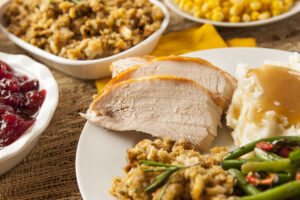November 03, 2020 | Black & Kletz Allergy

It is important to note that approximately 4% of adults and 5% of children in the U.S. have food allergies. The most common 8 food allergens are milk, egg, soy, wheat, peanut, tree nut, fish, and shellfish. These 8 foods cause nearly 90% of most food allergy reactions.
It should be noted that peanuts are not actually nuts because they grow from the ground and not from a tree. Peanuts are classified as legumes and are closely related to other legumes such as beans (e.g., black, lima, navy, kidney, pinto, fava, lupin, mung, soybeans), chickpeas (i.e., garbanzo beans), lentils, and peas. Most allergists instruct their peanut allergic patients to avoid all legumes in addition to avoiding peanuts.
Knowing the above information, the person hosting a Thanksgiving holiday celebration should ask their guests if they have a food allergy or food sensitivity. They should also inform their guests who are preparing and/or bringing food to the host/hostess’ house about any food allergies or food sensitivities that any of the guests have so they can provide a list of ingredients used in their dishes. The goal is to make sure that the food-allergic or food-sensitive individual does not ingest any of the offending food allergen on purpose or accidentally.
When one thinks of Thanksgiving, the food most thought of is turkey. Although a turkey allergy is not very common, it is more common to have individuals experience sleepiness or fatigue after eating turkey meat. This adverse reaction to turkey is not an allergy, but classified as a food sensitivity to the amino acid “L-tryptophan.” L-tryptophan is found in high levels in turkey meat. The L-tryptophan travels from the gastrointestinal tract to the brain where it is converted to a serotonin. It is this chemical, serotonin, that is responsible for causing this sleepiness or fatigue.
There are 2 other common food sensitivities that should be known to all. The first food sensitivity is called “lactose intolerance.” It occurs when the body is unable to fully digest the sugar called lactose which is commonly found in milk and dairy products. This inability to break down lactose is due to a lack or decreased amount of the enzyme lactase. Lactose intolerance may cause gastrointestinal side effects such as abdominal bloating, abdominal pain, nausea, and/or diarrhea in affected individuals. The second food sensitivity one hears a lot about recently is called “gluten intolerance” or “gluten sensitivity.” No one is exactly sure of the mechanism of gluten intolerance but individuals with this condition experience abdominal bloating, abdominal pain, nausea, diarrhea, and/or constipation after eating foods containing gluten (i.e., wheat, barley, rye). Some patients also complain of fatigue and headaches as well. The symptoms resemble individuals with wheat allergy (i.e., celiac disease) and/or irritable bowel syndrome. Unlike celiac disease, however, gluten sensitivity does not cause damage the intestines.
The gravy used for turkey and mashed potatoes commonly contains dairy (e.g., milk), wheat, and/or soy. It is important to remember that tiny amounts of a food allergen may be all that is necessary to cause a severe allergic reaction is a sensitive individual. One must be careful about every ingredient in a food or dish.
Common food allergens such as milk, egg, soy, wheat, nuts, and peanuts are often found around the Thanksgiving Day table. Tree nuts are frequently found on string beans as well as in some types of stuffing. Tree nuts and peanuts are common in many desserts such as brownies, cookies, cakes, and pecan pie. Eggs and milk (i.e., dairy) are also used in many baked goods. Although pumpkin allergies are not common, pumpkin pie may contain an assortment of ingredients that may trigger a food allergy in susceptible allergic individuals. Many families incorporate a multitude of ethnic foods in their celebrations. These cultural foods may not be traditional, but they increase the possibility of other allergenic foods such as fish and shellfish to be the causative agent of an approaching food allergy. If someone has a serious food allergy, it is sensible for that person to bring their own food rather than eat food in which they are not 100% sure of its ingredients and origin.
The board certified allergists at Black & Kletz Allergy have been diagnosing and managing food allergies, other allergies, and asthma for more than 50 years in the Washington, DC, Northern Virginia, and Maryland metropolitan area. We have convenient locations in Washington, DC, McLean, VA (Tysons Corner, VA), and Manassas, VA. Each office has on-site parking. The Washington, DC and McLean, VA offices are Metro accessible and there is a free shuttle that runs between our McLean, VA office and the Spring Hill metro station on the silver line. Please call for an appointment if you would like a consultation with one of our allergists, or alternatively, you can click Request an Appointment and we will respond within 24 hours by the next business day. Black & Kletz Allergy prides itself in providing quality allergy and asthma care to the Washington, DC, Northern Virginia, and Maryland metropolitan area community.












